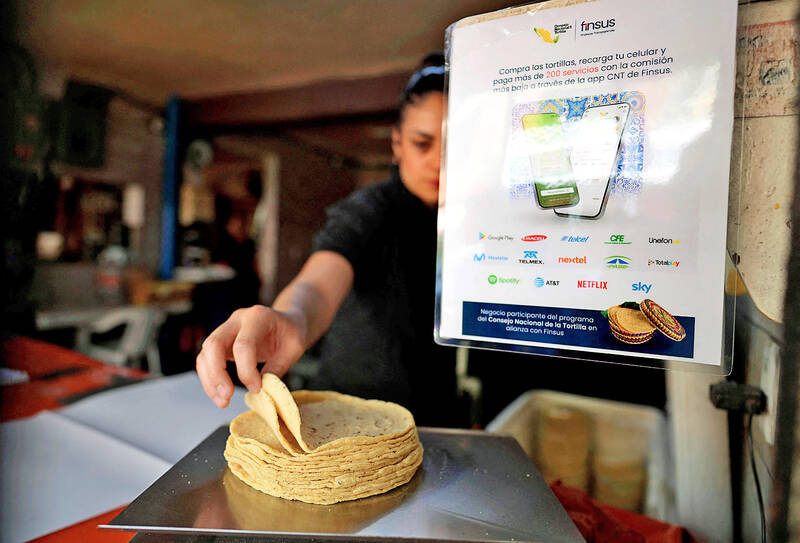Long marginalized by the banking industry, Mexico’s neighborhood tortilla producers are cautiously embracing financial technology in a country where cash is still king for many.
The Mexican National Tortilla Council and technology firm Finsus have developed a mobile application that allows vendors of the staple food to charge customers using cards, QR codes or a cellphone number.
“It’s revolutionizing the industry,” said organization president Homero Lopez Garcia, whose ambitious goal is for 90 percent of tortilla makers to use the app within three years.

Photo: AFP
The feedback from those who have tried it has been positive.
“They say: ‘I like it, I understand it,’” he said.
The hope is that the app would also enable tortilla producers to generate additional income by offering their clients cellphone top-up and bill payment services.
For many, the app is their first link to the formal financial industry.
Only about half of Mexico’s 129 million inhabitants have a bank account and most tortilla shops operate informally.
Although it is still in the testing phase, the app is already making life easier for tortilla producer Abel Garcia, who has been in the business for 25 years.
The 60-year-old said that he started out using family savings after failing to get a bank loan, and now owns several stores.
“It was difficult to get credit — very, very difficult!” Garcia said in the working-class district of Iztapalapa.
His success finally gave him access to banks, but with restrictions that put him off using them.
“That’s why we tore up the checkbook,” he said.
Tortillas are consumed by millions of Mexicans every day and an estimated 110,000 to 135,000 businesses are involved in their production, according to official and industry figures.
Most of them operate in the informal economy, as do many Mexican workers.
Mexico City for example is home to about 18,000 tortilla shops, according to the Mexican statistics institute INEGI.
However, only about 10 percent of them are legally registered, figures from the city government show.
Without access to the formal financial system, many of them prefer dealing in cash.
A 2021 survey by the Mexican National Banking and Securities Commission found that 64 percent of Mexicans preferred notes and coins over debit or credit cards.
Maria Adelaida Francisco, who works in a tortilla shop in Mexico City, had never used a financial application until her boss Jorge Ramirez suggested she try the new one.
Now the 40-year-old uses it to pay her electricity bill, she said.
Some tortilla producers avoid banks for fear of paperwork or debts.
“They’re a bit scared of the tax issue or they don’t know about it,” Ramirez, 35, said.
Several of his eight employees now use the application to collect their salaries.
The change reflects a wider embrace of financial technology in Latin America’s second-largest economy.
A study by the Inter-American Development Bank and the venture capital company Finnovista showed that Mexico is home to 20 percent of the region’s financial technology ventures, behind only Brazil.
The number of fintech start-ups in Latin America and the Caribbean increased more than four-fold between 2017 and last year, to 3,069 across 26 countries, the report said.
Despite the advances, the financial inclusion of Mexico’s tortilla makers is still “zero,” National Tortilla Council president Lopez Garcia said.
“The banks don’t believe in the industry,” he said.

In Italy’s storied gold-making hubs, jewelers are reworking their designs to trim gold content as they race to blunt the effect of record prices and appeal to shoppers watching their budgets. Gold prices hit a record high on Thursday, surging near US$5,600 an ounce, more than double a year ago as geopolitical concerns and jitters over trade pushed investors toward the safe-haven asset. The rally is putting undue pressure on small artisans as they face mounting demands from customers, including international brands, to produce cheaper items, from signature pieces to wedding rings, according to interviews with four independent jewelers in Italy’s main

Macronix International Co (旺宏), the world’s biggest NOR flash memory supplier, yesterday said it would spend NT$22 billion (US$699.1 million) on capacity expansion this year to increase its production of mid-to-low-density memory chips as the world’s major memorychip suppliers are phasing out the market. The company said its planned capital expenditures are about 11 times higher than the NT$1.8 billion it spent on new facilities and equipment last year. A majority of this year’s outlay would be allocated to step up capacity of multi-level cell (MLC) NAND flash memory chips, which are used in embedded multimedia cards (eMMC), a managed

Japanese Prime Minister Sanae Takaichi has talked up the benefits of a weaker yen in a campaign speech, adopting a tone at odds with her finance ministry, which has refused to rule out any options to counter excessive foreign exchange volatility. Takaichi later softened her stance, saying she did not have a preference for the yen’s direction. “People say the weak yen is bad right now, but for export industries, it’s a major opportunity,” Takaichi said on Saturday at a rally for Liberal Democratic Party candidate Daishiro Yamagiwa in Kanagawa Prefecture ahead of a snap election on Sunday. “Whether it’s selling food or

In the wake of strong global demand for AI applications, Taiwan’s export-oriented economy accelerated with the composite index of economic indicators flashing the first “red” light in December for one year, indicating the economy is in booming mode, the National Development Council (NDC) said yesterday. Moreover, the index of leading indicators, which gauges the potential state of the economy over the next six months, also moved higher in December amid growing optimism over the outlook, the NDC said. In December, the index of economic indicators rose one point from a month earlier to 38, at the lower end of the “red” light.